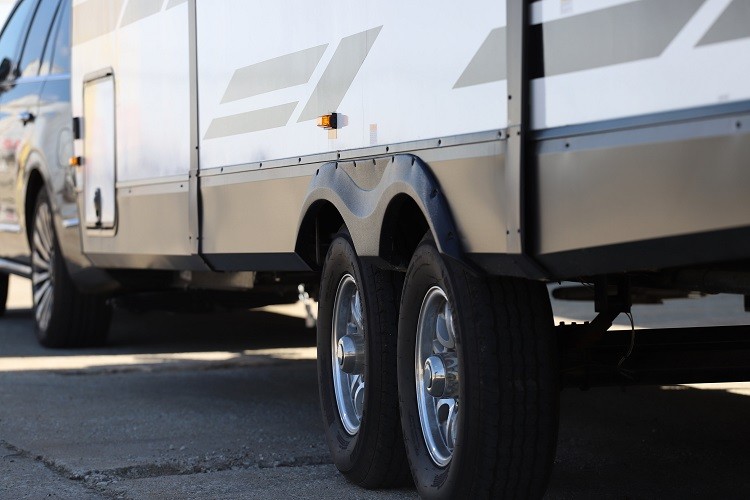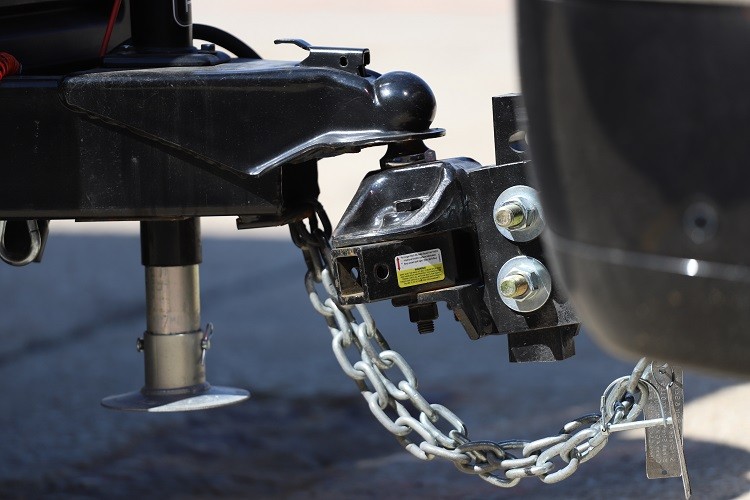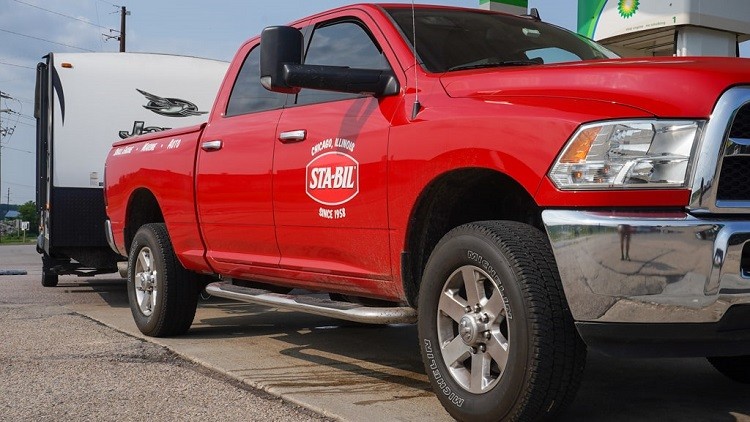Are you dreaming of hitting the open road with a travel trailer but unsure what size truck you need? At TRAVELS.EDU.VN, we understand that choosing the right truck is crucial for a safe and enjoyable journey. We’ll guide you through the key factors, including trailer weight and towing capacity, to help you select the perfect match for your travel needs. Let TRAVELS.EDU.VN take the stress out of your travel planning so you can focus on making memories in beautiful destinations like Napa Valley. Let’s explore travel trailer weights, truck types, and the importance of payload capacity for your road trip.
1. Understanding Travel Trailer Weights and Towing Capacity
Before you even think about specific truck models, it’s essential to understand the different weight ratings associated with travel trailers and trucks. These ratings determine whether a particular truck can safely tow a specific travel trailer. Overlooking these numbers can lead to dangerous situations on the road.
- GVWR (Gross Vehicle Weight Rating): This is the maximum permissible weight of the trailer when fully loaded, including all cargo, fluids, and passengers.
- Dry Weight (Unloaded Vehicle Weight): This is the weight of the travel trailer as it leaves the factory, without any cargo, fluids, or options.
- Cargo Capacity: This is the maximum weight of cargo, fluids, and passengers you can add to the travel trailer. It’s calculated by subtracting the dry weight from the GVWR.
- Towing Capacity: This is the maximum weight a truck can safely tow, as specified by the manufacturer.
- Payload Capacity: This is the maximum weight a truck can carry in its cabin and bed, including passengers, cargo, and the weight of the hitch.
 RV trailer with double wheels parked in a campground
RV trailer with double wheels parked in a campground
Alt: RV trailer parked in a campground with double wheels, emphasizing stability for comfortable family camping.
Important Consideration: Always use the GVWR of the travel trailer when determining if a truck can tow it safely. Never rely on the dry weight, as this number doesn’t account for the added weight of your gear.
2. Matching Truck Type to Travel Trailer Size
The size and weight of your travel trailer will largely dictate the type of truck you need. Here’s a general guideline:
| Travel Trailer Type | Weight Range (GVWR) | Recommended Truck Type | Considerations |
|---|---|---|---|
| Lightweight Travel Trailer | Up to 3,500 lbs | Mid-Size Truck or SUV | Check towing capacity and payload capacity. |
| Mid-Size Travel Trailer | 3,500 – 6,000 lbs | Full-Size Truck | Consider engine options and axle ratio for optimal towing performance. |
| Large Travel Trailer | 6,000 – 10,000 lbs | Heavy-Duty Truck | Requires a truck with sufficient towing capacity and a robust suspension system. |
| Extra-Large Travel Trailer | Over 10,000 lbs | Heavy-Duty Truck (e.g., F-350, Ram 3500) | Professional installation of a fifth-wheel hitch may be required. |
Note: These are general recommendations. Always consult the truck manufacturer’s specifications and your travel trailer’s GVWR to ensure a safe match.
3. Exploring Mid-Size Trucks for Smaller Travel Trailers
If you’re looking to tow a lightweight travel trailer, a mid-size truck or SUV might be a good option. These vehicles offer a balance of fuel efficiency and towing capability. Some popular mid-size truck options include:
- Toyota Tacoma: Known for its reliability and off-road capability.
- Chevrolet Colorado: Offers a comfortable ride and a variety of engine options.
- Ford Ranger: A fuel-efficient option with a strong towing capacity.
Key Considerations for Mid-Size Trucks:
- Towing Capacity: Ensure the truck’s towing capacity exceeds the GVWR of your travel trailer.
- Payload Capacity: Calculate the total weight of passengers, cargo, and the hitch to ensure you don’t exceed the truck’s payload capacity.
- Engine Performance: Choose an engine that provides sufficient power and torque for towing, especially on hilly terrain.
4. Full-Size Trucks: The Workhorses for Larger Travel Trailers
For larger travel trailers, a full-size truck is typically required. These trucks offer greater towing capacity, payload capacity, and stability. Popular full-size truck options include:
- Ford F-150: America’s best-selling truck, known for its versatility and advanced technology.
- Chevrolet Silverado 1500: Offers a comfortable ride and a variety of engine options, including a diesel.
- Ram 1500: Known for its luxurious interior and smooth ride.
Key Considerations for Full-Size Trucks:
- Towing Capacity: Verify that the truck’s towing capacity is significantly higher than the GVWR of your travel trailer.
- Payload Capacity: Carefully calculate the total weight of passengers, cargo, and the hitch to ensure you stay within the truck’s payload capacity.
- Engine Options: Consider a V8 engine or a turbocharged engine for optimal towing performance.
 RV trailer parked in a wooded campground
RV trailer parked in a wooded campground
Alt: RV trailer parked in a wooded campground, illustrating the peace and enjoyment of camping with the right travel trailer setup.
5. Heavy-Duty Trucks: The Kings of Towing for Extra-Large Travel Trailers
If you plan to tow an extra-large travel trailer, a heavy-duty truck is essential. These trucks are built to handle the most demanding towing tasks. Common heavy-duty truck options include:
- Ford F-250/F-350: Offer exceptional towing and payload capabilities, with a range of engine options, including powerful diesels.
- Chevrolet Silverado 2500HD/3500HD: Provide a comfortable ride and advanced towing technology.
- Ram 2500/3500: Known for their luxurious interiors and powerful engines.
Key Considerations for Heavy-Duty Trucks:
- Towing Capacity: Confirm that the truck’s towing capacity is well above the GVWR of your travel trailer.
- Payload Capacity: Pay close attention to the truck’s payload capacity, as heavy-duty trucks are often used for carrying substantial cargo.
- Axle Ratio: Choose an appropriate axle ratio for optimal towing performance and fuel efficiency.
- Fifth-Wheel Hitch: If your travel trailer requires a fifth-wheel hitch, ensure it is professionally installed.
6. Understanding Payload Capacity: More Than Just Towing
Many people focus solely on towing capacity when choosing a truck for towing a travel trailer. However, payload capacity is just as crucial. Payload capacity refers to the maximum weight a truck can carry in its cabin and bed, including passengers, cargo, and the weight of the hitch.
Why is Payload Capacity Important?
- Safety: Exceeding the payload capacity can compromise the truck’s handling and braking ability, leading to dangerous situations.
- Performance: Overloading the truck can strain the engine and transmission, reducing performance and fuel efficiency.
- Durability: Consistently exceeding the payload capacity can accelerate wear and tear on the truck’s components.
How to Calculate Payload Capacity:
- Find the truck’s GVWR (Gross Vehicle Weight Rating) on the driver’s side doorjamb.
- Weigh your truck with a full tank of gas and all passengers and cargo.
- Subtract the actual weight from the GVWR. The result is your remaining payload capacity.
- Make sure the tongue weight of your trailer does not cause you to exceed your payload capacity
Example:
- Truck GVWR: 10,000 lbs
- Truck Actual Weight (with passengers and cargo): 7,000 lbs
- Remaining Payload Capacity: 3,000 lbs
7. The Importance of Hitch Types and Weight Distribution
The type of hitch you use to connect your truck to your travel trailer is crucial for safe and stable towing. There are two primary types of hitches:
- Weight-Carrying Hitch: This type of hitch relies solely on the truck’s suspension to support the weight of the trailer tongue. It’s suitable for lightweight travel trailers.
- Weight-Distributing Hitch: This type of hitch uses spring bars to distribute the weight of the trailer tongue across the truck’s axles and the trailer’s axles. It’s essential for larger travel trailers, as it improves handling and stability.
- Fifth-Wheel Hitch: This type of hitch mounts in the bed of the truck and is used to connect large trailers to the truck.
Benefits of a Weight-Distributing Hitch:
- Improved Handling: Distributes weight evenly, reducing sway and improving steering control.
- Enhanced Stability: Minimizes trailer bounce and provides a smoother ride.
- Increased Towing Capacity: Some weight-distributing hitches can increase the truck’s towing capacity.
 RV trailer hitch connected by chain, ready for a camping trip
RV trailer hitch connected by chain, ready for a camping trip
Alt: RV trailer hitch connected by chain, showcasing the equipment needed to link trailer to vehicle for secure travel.
8. Optimizing Fuel Economy While Towing
Towing a travel trailer will inevitably impact your truck’s fuel economy. However, you can take steps to minimize the effect.
Tips for Improving Fuel Economy While Towing:
- Drive at a Moderate Speed: Reduce your speed to 55-60 mph to minimize wind resistance.
- Maintain Proper Tire Pressure: Ensure your truck and travel trailer tires are properly inflated.
- Avoid Sudden Acceleration and Braking: Drive smoothly and anticipate traffic conditions.
- Use Cruise Control: On flat terrain, cruise control can help maintain a consistent speed.
- Minimize Cargo Weight: Pack only essential items to reduce the overall weight of your travel trailer.
- Consider a Fuel-Efficient Truck: Choose a truck with a fuel-efficient engine, such as a diesel or a turbocharged engine.
Fuel Economy Considerations for Different Truck Types:
| Truck Type | Typical Fuel Economy (Towing) | Considerations |
|---|---|---|
| Mid-Size Truck | 15-20 mpg | Fuel economy can vary depending on the engine and driving conditions. |
| Full-Size Truck | 10-15 mpg | Diesel engines generally offer better fuel economy than gasoline engines. |
| Heavy-Duty Truck | 8-12 mpg | Fuel economy can be significantly impacted by the weight of the travel trailer. |
9. Understanding Towing Technologies and Features
Modern trucks offer a range of towing technologies and features designed to make towing safer and easier. Some of these features include:
- Trailer Sway Control: Helps to prevent and correct trailer sway.
- Hill Start Assist: Prevents the truck from rolling backward when starting on a hill.
- Integrated Trailer Brake Controller: Allows you to adjust the trailer brakes from the truck’s cabin.
- Blind Spot Monitoring with Trailer Coverage: Extends the blind spot monitoring system to include the length of the trailer.
- Rearview Camera with Trailer Guidance: Provides a clear view of the trailer hitch for easier hookups.
Benefits of Towing Technologies:
- Enhanced Safety: Helps to prevent accidents and improve overall safety.
- Improved Handling: Makes towing easier and more comfortable, especially in challenging conditions.
- Increased Confidence: Gives drivers greater confidence when towing a travel trailer.
10. Why Choose TRAVELS.EDU.VN for Your Napa Valley Travel Trailer Adventure?
Planning a trip to Napa Valley with your travel trailer? TRAVELS.EDU.VN can help you create an unforgettable experience. We offer:
- Expert Guidance: Our experienced travel specialists can help you choose the right travel trailer for your needs and budget.
- Customized Itineraries: We’ll create a personalized itinerary that includes the best wineries, restaurants, and attractions in Napa Valley.
- Preferred Campground Reservations: We have established relationships with the top campgrounds in Napa Valley, ensuring you get the best spots.
- Concierge Services: From arranging wine tastings to booking transportation, we’ll take care of every detail.
Why TRAVELS.EDU.VN is the Best Choice for Your Napa Valley Trip:
- Local Expertise: We know Napa Valley inside and out.
- Personalized Service: We tailor our services to your unique needs and preferences.
- Stress-Free Planning: We handle all the details, so you can relax and enjoy your vacation.
- Unforgettable Experiences: We’ll help you create memories that will last a lifetime.
 red pickup truck at fuel pump, ready for a road trip
red pickup truck at fuel pump, ready for a road trip
Alt: Red pickup truck fueling up at a gas pump, preparing for a road trip adventure, emphasizing preparedness for travel.
Imagine:
- Driving through the rolling hills of Napa Valley, with your travel trailer in tow, knowing you have the perfect truck for the job.
- Pulling into a beautiful campground, surrounded by vineyards, with a pre-arranged reservation from TRAVELS.EDU.VN.
- Spending your days exploring world-class wineries, indulging in gourmet meals, and creating unforgettable memories.
- Relaxing in your comfortable travel trailer each evening, knowing that every detail has been taken care of by TRAVELS.EDU.VN.
Don’t let the stress of planning a travel trailer trip to Napa Valley hold you back. Contact TRAVELS.EDU.VN today, and let us help you create the vacation of your dreams.
Contact Information:
- Address: 123 Main St, Napa, CA 94559, United States
- Whatsapp: +1 (707) 257-5400
- Website: TRAVELS.EDU.VN
FAQ: Choosing the Right Truck for Your Travel Trailer
- What is the most important factor to consider when choosing a truck to tow a travel trailer?
- The most important factor is the GVWR (Gross Vehicle Weight Rating) of the travel trailer. Ensure the truck’s towing capacity exceeds the GVWR of the travel trailer.
- Can I use a mid-size truck to tow a travel trailer?
- Yes, but only for lightweight travel trailers with a GVWR under 3,500 lbs. Check the truck’s towing capacity and payload capacity.
- What is payload capacity, and why is it important?
- Payload capacity is the maximum weight a truck can carry in its cabin and bed, including passengers, cargo, and the hitch. It’s important for safety, performance, and durability.
- What type of hitch do I need for a large travel trailer?
- A weight-distributing hitch is essential for large travel trailers, as it improves handling and stability.
- How can I improve fuel economy while towing a travel trailer?
- Drive at a moderate speed, maintain proper tire pressure, avoid sudden acceleration and braking, and minimize cargo weight.
- What are some of the towing technologies available on modern trucks?
- Towing technologies include trailer sway control, hill start assist, integrated trailer brake controller, and blind spot monitoring with trailer coverage.
- Do diesel trucks offer better fuel economy than gasoline trucks when towing?
- Generally, yes. Diesel trucks tend to offer better fuel economy when towing heavy loads.
- What is the difference between towing capacity and GVWR?
- Towing capacity is the maximum weight a truck can safely tow, while GVWR is the maximum permissible weight of a vehicle (truck or trailer) when fully loaded.
- How do I find the towing capacity of my truck?
- Check the truck’s owner’s manual or the manufacturer’s website. You can also find it on a sticker located on the driver’s side doorjamb.
- Why should I choose TRAVELS.EDU.VN for my Napa Valley travel trailer adventure?
- TRAVELS.EDU.VN offers expert guidance, customized itineraries, preferred campground reservations, and concierge services to create an unforgettable experience.
Ready to embark on your Napa Valley travel trailer adventure? Contact travels.edu.vn today to start planning your dream vacation. Our team is waiting to assist you with every step of the process, ensuring a seamless and memorable experience.